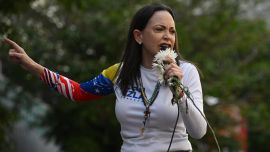Winter isn't coming – Winter is here. The country, or Buenos Aires City and Greater Buenos Aires to be more precise, is still fighting the coronavirus pandemic. Cases have spiked recently. Over 2,000 cases are now reported on a daily basis, the vast majority in the metropolitan area (Buenos Aires City and the sprawling urban belt that surrounds it, Greater Buenos Aires).
At the time of writing, President Alberto Fernández, the centre-left Peronist who took office in December, was poised to tighten the lockdown, again flanked by Buenos Aires City Mayor Horacio Rodríguez Larreta, a prominent member of the centre-right opposition coalition, and Buenos Aires Governor Axel Kicillof, a progressive Peronist. Authorities are now grappling to avoid the collapse of the health system, even though Argentina's situation on paper looks much better than in neighbouring Brazil and Chile.
The lockdown will be tightened once more in response to an increase in cases. Rodríguez Larreta had recently allowed joggers to head out for runs and children to leave the homes for one-hour walks on weekends, with non-essential local shops open in the nation's capital. But what is now looming points towards hibernation and the maximum restriction of the use of public transport. The pandemic is a tremendous challenge for the metropolitan area, which is dealing with around 90 percent of cases. Only history will explain the true extent of economic devastation in the region.
The lockdown was initially announced on March 20. At stake is the credibility of the nation's rulers. The backdrop is a thinly-veiled political tussle between Buenos Aires City (a centre-right bastion where more voters support the relaxation lockdown restrictions) and Buenos Aires Province (generally a Kirchnerite stronghold). Still, both sides are showing manners and are holding regular meetings to sort out their differences before announcing decisions together.
Is it the end of polarisation? Not really. Political tempers ran high last weekend over the planned nationalisation of the debt-ridden soy crusher Vicentin, based in Santa Fe Province. On Saturday (June 20, Flag Day) a flag-waving protest was staged against the president's recent decision to take over Vicentin – a once private sector jewel that’s now in deep financial trouble – and the submission of a bill to Congress for its outright nationalisation. The announcement outraged business and farming leaders. The flag-waving, mainly in northern Santa Fe Province and downtown Buenos Aires, in the middle of a pandemic, was quite a sight. Yet it now looks like the battle for Vicentin (saddled with US$1.2 billion in debt) has been put on ice.
A local judge, handling the company's administration, has ruled against granting the president's federal trustee the power to run the company. Technically the nationalisation bill has not yet been submitted to Congress while the judge considers an alternative takeover plan tabled by Santa Fe Governor Omar Perotti, a centrist Peronist. The judge has not ruled in favour of the governor's plan, which would place the company under state control with a provincial trustee involved, and instead has sent it through a separate legal channel.
The local judge, who has his office in one of the towns where the private company has been based for 90 years, was on his way to becoming a political hero to the centre-right sectors organising the protests and to the locals who back the company. The situation could spell electoral disaster for Perotti, who won back the big province for the Peronists after years for Socialist-Radical rule. The national government appears to have called a time out after the protest gained momentum with the support, especially in Buenos Aires City, of those who claim that the quarantine is too strict and is being used as an excuse to curtail individual liberties.
The news here is that the left-wing of the ruling Frente de Todos coalition seems to have decided to avoid direct confrontation with the fuming protesters, who are backed by powerful free-market business and agricultural lobbies. President Alberto Fernández’s coalition does not control the lower house of Congress and the Vicentin bill was heading for a fierce debate in the Chamber of Deputies. The Peronist front, however, controls the Senate, which is headed by Vice-President Cristina Fernández de Kirchner.
The latest parliamentary move is the approval, in the Senate, of a bill to establish a bicameral commission to probe Vicentin’s huge debt with state-run Banco Nación – lower house approval of the commission is pending. Much of that Banco Nación loan money was granted to Vicentin after former president Mauricio Macri lost the presidential elections to Fernández last year. Vicentin was a major contributor to Macri's presidential campaign and the bank’s new directors allege that the loans granted to the soy crusher, which was clearly in trouble, look fishy. Support for the family behind the firm could wane, depending on the findings of the parliamentary commission.
The Vicentin conflict, which for a week dominated the national conversation and has the potential to become a dominant electoral issue, is now moving at a slower pace. In the lower house the Frente de Todos caucus, controlled by the Kirchnerite wing, has instead now switched its attention to sponsoring a bill to regulate the donation of blood plasma used on virus patients, with the backing of the opposition Juntos por el Cambio coalition. The flag of consensus is suddenly being waved, with the trumpeting of the bipartisan donation bill arriving almost immediately after that nasty bout of sabre-rattling over Vicentin.
Ultimately, it’s the 2021 midterm elections that will reveal who will pay the political price for the political and economic consequences of the pandemic. The pending restructuring of Argentina's massive sovereign debt remains a key part of the equation. Negotiations with the bondholders, who are owed more than US$65 billion in debt, have now been extended until 24, but the language is getting fiercer and the reports suggest talks have stalled. Many deadlines have already come and gone, rendered meaningless after Fernández implied recently that the talks to reach a deal could drag on for a year. Make yourself comfortable.




















Comments